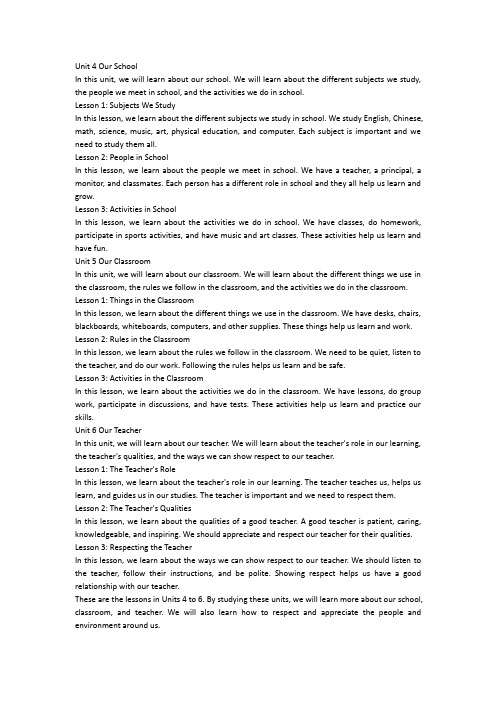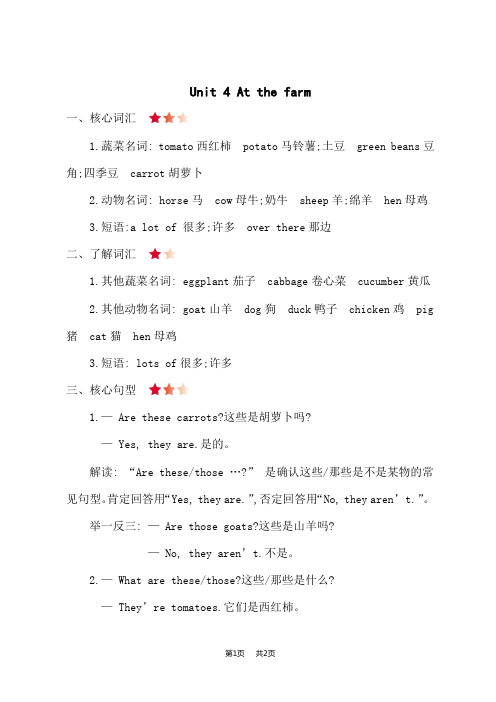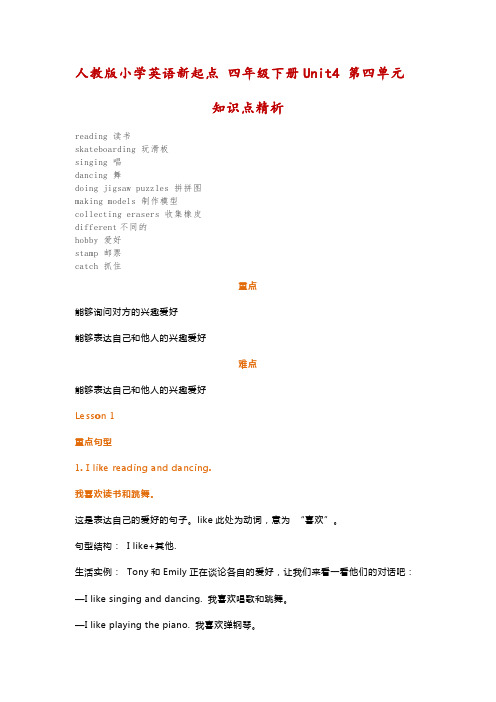小学英语四年级下册uni4
英语四年级下册第四单元课文

Unit 4 Our SchoolIn this unit, we will learn about our school. We will learn about the different subjects we study, the people we meet in school, and the activities we do in school.Lesson 1: Subjects We StudyIn this lesson, we learn about the different subjects we study in school. We study English, Chinese, math, science, music, art, physical education, and computer. Each subject is important and we need to study them all.Lesson 2: People in SchoolIn this lesson, we learn about the people we meet in school. We have a teacher, a principal, a monitor, and classmates. Each person has a different role in school and they all help us learn and grow.Lesson 3: Activities in SchoolIn this lesson, we learn about the activities we do in school. We have classes, do homework, participate in sports activities, and have music and art classes. These activities help us learn and have fun.Unit 5 Our ClassroomIn this unit, we will learn about our classroom. We will learn about the different things we use in the classroom, the rules we follow in the classroom, and the activities we do in the classroom. Lesson 1: Things in the ClassroomIn this lesson, we learn about the different things we use in the classroom. We have desks, chairs, blackboards, whiteboards, computers, and other supplies. These things help us learn and work. Lesson 2: Rules in the ClassroomIn this lesson, we learn about the rules we follow in the classroom. We need to be quiet, listen to the teacher, and do our work. Following the rules helps us learn and be safe.Lesson 3: Activities in the ClassroomIn this lesson, we learn about the activities we do in the classroom. We have lessons, do group work, participate in discussions, and have tests. These activities help us learn and practice our skills.Unit 6 Our TeacherIn this unit, we will learn about our teacher. We will learn about the teacher's role in our learning, the teacher's qualities, and the ways we can show respect to our teacher.Lesson 1: The Teacher's RoleIn this lesson, we learn about the teacher's role in our learning. The teacher teaches us, helps us learn, and guides us in our studies. The teacher is important and we need to respect them. Lesson 2: The Teacher's QualitiesIn this lesson, we learn about the qualities of a good teacher. A good teacher is patient, caring, knowledgeable, and inspiring. We should appreciate and respect our teacher for their qualities. Lesson 3: Respecting the TeacherIn this lesson, we learn about the ways we can show respect to our teacher. We should listen to the teacher, follow their instructions, and be polite. Showing respect helps us have a good relationship with our teacher.These are the lessons in Units 4 to 6. By studying these units, we will learn more about our school, classroom, and teacher. We will also learn how to respect and appreciate the people and environment around us.。
人教版小学英语精通版 四年级下册Unit4 第四单元知识点精讲

人教版小学英语精通版四年级下册Unit4 第四单元知识点精讲day 天week 周Sunday 星期日Monday 星期一Tuesday 星期二Wednesday 星期三Thursday 星期四Friday 星期五Saturday 星期六today 今天weekend 周末park 公园theme park 公园theme park 主题公园;游乐园知识点精析Lesson 191. 如何询问一周有多少天课文应用:-How many days are there in a week? 一周有多少天?-There seven. 有七天。
句型结构:问句: How many days are there in a week?答语: There are seven (days in a week)./ Seven.重点解析:问句用于询问一周有多少天。
how many意为“多少”,用于对可数事物的数量进行提问。
例:Mr. Black: How many days are there in a week? 一周有多少天?Mike: There are seven days in a week. 一周有七天。
2. in和on的用法课文应用:How many days are there in a week? 一周有多少天?(1)in 用在月份、季节前,也可用于表示“在上午/下午/晚上”等。
例如:in May在五月,in summer在夏天,in the evening在晚上。
(2)on 用在星期、日期、节日等“具体某一天”前。
例如: on Monday在星期一,on June15th在六月十五日,on Children s Day在儿童节,on that day在那天。
3. let 型祈使句课文应用:Let s go and play. 让我们去玩。
句型结构:Let+第一人称或第三人称宾格(me, us, him...)十动词原形(help, go, play…)(+其他).重点解析:let型祈使句主要有两种用法:表示“建议;劝导”。
四年级英语下册第四单元

四年级英语下册第四单元Unit 4: Our CommunityIn this unit, we will explore our community and learn about different places and people in our neighborhood. We will also learn about the importance of community helpers and how they contribute to our society.Vocabulary:1. Community: a group of people living in the same area and sharing common interests.2. Neighborhood: the area around where you live.3. Market: a place where people buy and sell goods.4. Hospital: a place where people go to receive medical treatment.5. Post office: a place where people send and receive mail.6. Library: a place where people can borrow books and read.7. Police station: a building where police officers work and protect the community.8. School: a place where students go to learn.Dialogue:A: Hello, where do you live?B: I live in a community called Green Meadows. It's a peaceful neighborhood.A: That's nice. What is there in your community?B: We have a market where people buy fruits, vegetables, and other necessities. We also have a hospital, a post office, a library, a police station, and a school.A: That sounds convenient. Do you have any community events? B: Yes, we often have a community fair where people cometogether to celebrate. We also have a parade on Independence Day. A: That's wonderful. I wish my community had such events too. Reading Passage:Our CommunityA community is a group of people who live in the same area and share common interests. Our community, called Green Meadows, is a wonderful place to live. It is a peaceful neighborhood with many facilities and amenities.In our community, we have a market where people can buy fresh fruits, vegetables, and other necessities. The market is always bustling with activity, and it is a popular spot among the residents. People often come here to shop for their daily needs.We also have a hospital in our community. The hospital provides medical services and takes care of the health needs of the people. The doctors and nurses work tirelessly to ensure the well-being of the community members.The post office is another essential place in our community. It is where people send and receive mail. The post office staff is friendly and efficient, and they ensure that the letters and packages reach their destinations on time.Our community is proud to have a library, which is a treasure trove of knowledge. People can borrow books of all genres and read in the peaceful environment of the library. Many students and avid readers visit the library regularly to explore the world through books.For the safety of the community, we have a police station. The police officers work diligently to protect us and maintain law and order. They ensure that our community remains secure and peaceful for everyone.Last but not least, we have a school in our community. The school is a place of learning and growth for the children. The teachers are dedicated and passionate about their work, and they help us to develop our skills and knowledge.In conclusion, our community, Green Meadows, is a thriving and harmonious neighborhood. The facilities and community helpers contribute to the well-being and development of its residents. We are proud of our community and cherish the wonderful people and places that make it special.(Word count: 502 words)。
人教PEP 小学英语 四年级下册 Unit4单词(带音标和例句)

4B Unit41.tomato 1.西红柿/təˈmɑ:təu/ 例:有七个西红柿。
eg.There are seven tomatoes.2.potato 2.马铃薯;土豆/pə'teɪtəu/ 例:有六个土豆eg.There are six potatoes.3.green beans 3.豆角;四季豆/'bi:nz/ 例:我喜欢吃四季豆。
eg.I like to eat green beans.4.carrot 4.胡萝卜/'kærət/ 例:我喜欢吃胡萝卜。
eg.I like to eat carrots.5.horse 5.马/hɔ:s/ 例:有三匹马。
eg.There are three horses.6.cow 6.母牛;奶牛/kau/ 例:有两头奶牛。
eg.There are two cows.7.sheep7.羊;绵羊/ʃi:p/ 例:有九头绵羊。
eg.There are nine sheep.8.hen8.母鸡/hen/ 例:有八只母鸡。
eg.There are eight hens.9.these 9.(this的复数形式) 这些/ði:z/ 例:这些是鸭子。
Eg.These are ducks.10.yum 10.(表示味道或气味非常好)/jʌm/11.animal 11.兽;动物/ˈænɪml/ 例:你有许多的动物。
eg.You have a lot of animals.12.those 12. (that的复数形式)那些/ðəʊz/ 例:那些是苹果。
eg.Those are apples.13.garden 13.花园;菜园/ˈgɑ:dn/ 例:这是蔬菜园。
eg.This is the vegetable garden.14.farm 14.农场/fɑ:m/ 例:我们在农场里面。
eg.We are on the farm.15.goat 15.山羊/gəʊt/ 例:它们是山羊。
小学英语四年级下册单词Unit 4

(名词)花园;菜园
in the garden 在花园里
短语
vegetable garden 菜园
例句
My grandparents have a
beautiful garden.
我的祖父母有一个美丽的花园。
(名词)山羊
复数
goats
形近词 巧记
boat 小船 boat(小船) b改为g goat(山羊)
I like the soup. Yum! 我喜欢这个汤。真美味! yummy(形容词)很好吃的
(名词)西红柿
复数
tomatoes
短语
tomato noodles 西红柿面条
tomato soup 西红柿汤
例句
I’d like some tomato soup.
我想要一些西红柿汤。
豆角;四季豆
carrot juice 胡萝卜汁 parrot 鹦鹉 The parrot likes carrots. 这只鹦鹉喜欢胡萝卜。
(名词)兽;动物
复数
animals
短语
an animal 一只动物
wild animals 野生动物
例句
I like the book about animals.
我喜欢那本关于动物的书。
(名词)母牛;奶牛
复数
cows
例句
That cow has a fat body.
那头奶牛有一个胖胖的身体。
(名词)母鸡
复数 对应词 形近词 例句
hens cock 公鸡 pen 钢笔 ten 十
—What’s it? 它是什么? —It’s a hen. 它是一只母鸡。
(名词)羊;绵羊
四年级下册英语第四单元

四年级下册英语第四单元Unit4:My FamilyIntroduction:In this unit,we will learn about family members andtheir relationships.We will also learn how to introduce our family members,describe them,and talk about our family activities.By the end of this unit,you will be able to have a conversation about your family in English.Lesson1:My FamilyIn this lesson,we will learn how to introduce our immediate family members.Our immediate family consists ofour parents,siblings,and ourselves.Here are some example sentences:-This is my father.His name is Mr.Smith.-I have a younger brother.His name is Alex.-These are my grandparents.They are my mother's parents.Lesson2:Describing Family MembersIn this lesson,we will learn how to describe our family members using adjectives.Adjectives are words that describe people or things.Here are some example sentences:-My mother is tall and beautiful.-My sister has long,curly hair.-My grandfather is old but very kind.Lesson3:Family ActivitiesIn this lesson,we will learn how to talk about ourfamily activities using present simple tense.Present simple tense is used to talk about regular actions or routines.Here are some example sentences:-We eat dinner together every evening.-My family and I go for a walk in the park on Sundays.-My sister plays the piano,and I like to watch her. Lesson4:Family TreeIn this lesson,we will learn how to draw and talk about our family tree.A family tree shows the relationships between family members.Here is an example sentence: -My aunt is my father's sister.Conclusion:In this unit,we have learned about family members,how to describe them,and how to talk about family activities.We have also learned how to draw and talk about our family tree. Remember to practice using the vocabulary and grammar we have learned in this unit to improve your English skills.Keep up the good work!。
人教PEP版小学四年级下册英语 Unit 4 At the farm 单元知识清单

Unit 4 At the farm一、核心词汇1.蔬菜名词: tomato西红柿potato马铃薯;土豆green beans豆角;四季豆carrot胡萝卜2.动物名词: horse马cow母牛;奶牛sheep羊;绵羊hen母鸡3.短语:a lot of 很多;许多over there那边二、了解词汇1.其他蔬菜名词: eggplant茄子cabbage卷心菜cucumber黄瓜2.其他动物名词: goat山羊dog狗duck鸭子chicken鸡pig 猪cat猫hen母鸡3.短语: lots of很多;许多三、核心句型1.— Are these carrots?这些是胡萝卜吗?— Yes, they are.是的。
解读: “Are these/those …?”是确认这些/那些是不是某物的常见句型。
肯定回答用“Yes, they are.”,否定回答用“No, they aren’t.”。
举一反三: — Are those goats?这些是山羊吗?— No, they aren’t.不是。
2.— What are these/those?这些/那些是什么?— They’re tomatoes.它们是西红柿。
解读: “What are + these/those?”是对复数名词提问的常见句型,回答时用“They’re + 名词复数形式.”举一反三: — What are those?那些是什么?— They are green beans.它们是豆角。
四、了解句型1.Look at these!看这些!2.Oh, I feel sleepy.哦,我困了。
解读:本句中含有系动词feel,其后要跟形容词作表语。
常见的系动词还有look, seem, taste, be, smell等,与feel的用法相同。
3.I love to eat green beans.我喜欢吃豆角。
解读: love to do sth 喜爱做某事同义句: I like to eat green beans.我喜欢吃豆角。
人教版小学英语新起点 四年级下册Unit4 第四单元知识点精析

人教版小学英语新起点四年级下册Unit4 第四单元知识点精析reading 读书skateboarding 玩滑板singing 唱dancing 舞doing jigsaw puzzles 拼拼图making models 制作模型collecting erasers 收集橡皮different不同的hobby 爱好stamp 邮票catch 抓住重点能够询问对方的兴趣爱好能够表达自己和他人的兴趣爱好难点能够表达自己和他人的兴趣爱好Lesson 1重点句型1. I like reading and dancing.我喜欢读书和跳舞。
这是表达自己的爱好的句子。
like此处为动词,意为“喜欢”。
句型结构:I like+其他.生活实例:Tony和Emily正在谈论各自的爱好,让我们来看一看他们的对话吧:—I like singing and dancing. 我喜欢唱歌和跳舞。
—I like playing the piano. 我喜欢弹钢琴。
2. like的用法(1)like作动词,意为“喜欢”,有对某人某事或某物赞许或产生兴趣的含义。
① like sb./ sth.意为“喜欢某人/某物”。
例:I like apples.我喜欢苹果。
②like与动名词连用,即like doing sth.,在意义上相当于enjoy doing sth.,意为“喜欢做某事”,表示经常性的习惯或爱好。
例:I like singing very much.我非常喜欢唱歌I don't like drawing. 我不喜欢画画。
③like与动词不定式连用,即like to do sth.,意为“喜欢做某事”,表示具体的一次行为。
He likes to playfootball at weekends. 他喜欢在周末踢足球。
(2)like 作介词,意为“像”。
例:He looks like hisfather.他看起来像他的爸爸。
- 1、下载文档前请自行甄别文档内容的完整性,平台不提供额外的编辑、内容补充、找答案等附加服务。
- 2、"仅部分预览"的文档,不可在线预览部分如存在完整性等问题,可反馈申请退款(可完整预览的文档不适用该条件!)。
- 3、如文档侵犯您的权益,请联系客服反馈,我们会尽快为您处理(人工客服工作时间:9:00-18:30)。
green beans 豆角,四季豆
They are so long.
They are so short.
Onions
洋葱
EXERCISE: 看谁读的好
1、师领读单词,学生跟读。 2、学生练习读音。 3、同桌、小组提问读单词。
GAME TIME 掷骰子
1、 师掷骰子,学生读出该 面的英语单词。
WARM UP: WELCO单词多?
学生分成A、B组进行单词对抗,每组依 次说出表示蔬菜水果的英语单词,多的小 组为优胜组。
Unit 4 At the farm
在农场
Part A let’s learn
学习目标:
1、能听、说、读、写单词: tomato,potato,carrot,green beans以及其 复数形式。
2、能用形容词描述蔬菜的特点,并对蔬 菜做出评价。掌握句型:They´re so long/big!
carrots 胡萝卜
This carrot is so_ta_l_l._
This carrot is so_s_h_o_r_t.
Potatoes 土豆
They are so big. They are so small.
2、小组代表上台掷骰子, 并读出该面单词。
WRITE WORDS:看谁写的好 口诀:心想、口说、手写
EXERCISE AND HOMEWORK
A: What do you like ? B: I like ________.
They are so _______. C: ………
tomatoes 西红柿
The tomato is red .
The tomatoes are red .
口诀:单数is 复数are
练习:绕口令
Tomatoes and potatoes, Potatoes and tomatoes, I love to eat tomatoes, I love to eat potatoes.
